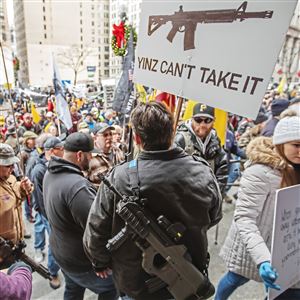Just seven weeks after a gunman killed 11 people at the Tree of Life synagogue, two city council members and Mayor Bill Peduto, introduced three local firearm regulation bills — including a red flag law. Mr. Peduto signed them into law on April 9.
But the city has agreed to stay the ordinances introduced by Pittsburgh City Council members Corey O’Connor and Erika Strassburger as it faces three lawsuits from state and local gun-rights groups who are pointing to a Pennsylvania law prohibiting municipalities from regulating firearms. Among the plaintiffs: four local residents who are backed by the National Rifle Association’s Institute for Legislative Action.
Mr. Peduto said earlier this year that he was hoping to enlist municipalities across the state to pass similar laws, with the expectation that they will be challenged by the NRA. If the gun lobbying organization chose to challenge all of them in court, it would strain its attention and resources, he reasoned, and possibly weaken its grip.
Plus, his hope was that a collection of local movements would rise to the state level.
“We have to do something to change the temperature in Harrisburg,” Mr. Peduto said then.
Speaking with the Post-Gazette in October, Mr. Peduto said he’s forged alliances with mayors of cities across the country to advocate for red flag laws and background checks. He joined a group of them for a recent White House meeting with Kellyanne Conway, where Mr. Peduto said he told the story of David and Cecil Rosenthal, two of the victims of the Tree of Life shooting.
But in Pennsylvania, there’s been no rush of municipalities spoiling for a fight over these measures. Mr. Peduto now believes Pittsburgh will be the test case.
“I think that if we’re successful you’re going to see in hundreds of cities similar legislation being proposed,” Mr. Peduto said.
Meanwhile, in Harrisburg, state lawmakers introduced a red flag law last year that drew opposition from unlikely bedfellows. The NRA and the American Civil Liberties Union of Pennsylvania both claimed it raised serious due process concerns regarding the Extreme Risk Protection Order legislation.
“The heart of the ERPO process requires speculation — on the part of both the petitioner and judges — about an individual’s risk of possible violence,” the ACLU wrote in a memo last year.
The legislation went nowhere. A red flag law introduced again during this session is stuck in committee.
First Published: October 23, 2019, 11:00 a.m.






















